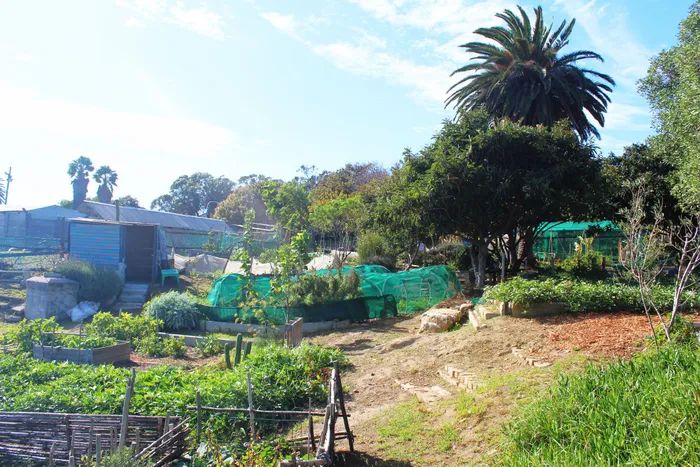Outrage over Oude Molen development bid

The Oude Molen Food Garden Village has been on the site for more than 20 years.
Oude Molen tenants are outraged by the provincial government’s plans to redevelop the site for social housing and mixed-use development.
The precinct on the border of Pinelands near the Black River is owned by the provincial Department of Infrastructure, and it includes the Oude Molen Eco Village with commercial, residential, educational and health institutions leasing from the province.
The province’s proposal is outlined in a 2021 document, seen by the Tatler, on the provincial government website. It describes plans to build social housing and mixed-used development and refers to a need to “provide access to cultural heritage and productive landscapes” and to “embracing the principles of sustainability into the design, construction and operational phases”.
It does not go into detail about the size and scope of the proposed development on the 14-hectare site, but it talks about using a technical team with engineers, landscaping and heritage specialists and environmental consultants.
The document seems to have only drawn attention from the Oude Molen community after a notice posted earlier this year on the provincial government’s website called on them to take part in a public participation process by registering as interested and affected parties by the beginning of April. The proposed development was also discussed at a meeting of Oude Molen residents and interest groups earlier this month.
Oude Molen Eco Village Tenants’ Association co-chairperson Faeez Evans, who runs a coffee shop at the site, said he was not anti-development, but future plans for the site should maintain its eco-village feel.
“If this development should get passed, the whole garden village on the site would be gentrified,” he said.
Kelly Mansfield, the manager of the Food Garden Village in Oude Molen, said a development that added more concrete blocks would threaten the character of the area.
“We need people who would keep the eco-village ethos like in agriculture, education, innovation.”
Oude Molen is also home to the Robin Trust non-profit, which cares for the elderly, and its chairperson, Cathy Miller, said the tenants and other concerned parties had not been adequately consulted about the plans.
“Robin Trust is a key component of Oude Molen. We do training for frail care, train nursing staff and have a sub-acute facility. We need to be part of the decision-making process and given guarantees as to our future at Oude Molen.”
Gary Harper, who is one of about 120 residents of Oude Molen, said the development would threaten more than 40 small businesses in the area if it went ahead.
Paramount Chief Aran, of the Goringhaicona Khoena clan, who runs the Kraal non-profit company that grows vegetables and herbs and gives talks to youngsters about nature and the dangers of drugs, said the plan threatened the area’s heritage. “Any development of high-rise buildings will obstruct the site and view of Table Mountain,” he said.
For more than two weeks, the Tatler has tried to get the Department of Infrastructure to answer our questions about its plans for Oude Molen, specifically on the size and scope of the development and its implications for small businesses, but while department spokesman Jandre Bakker has acknowledged receipt of our questions, they have remained unanswered.
We were also unable to get clarity from the department on where the public participation process is now.
Ward councillor Riad Davids said: “This is a very valuable tract of land and must form part of the future planning in the city and province. If properly developed with input from all sectors of society, it can become the jewel of the city.”
Observatory Civic Association chairman Professor Leslie London said meaningful public consultation should precede any development plan for such a significant site.
“This is a development not just affecting the Oude Molen residents and business, nor neighbouring communities in Observatory or Maitland Garden Village of Pinelands, but the whole of Cape Town because it is about what kind of city we want.”
